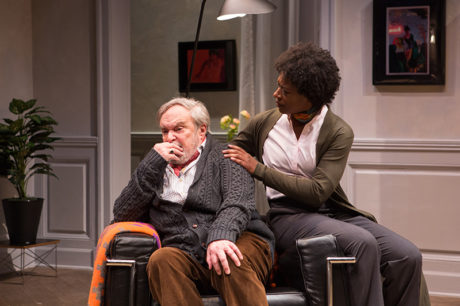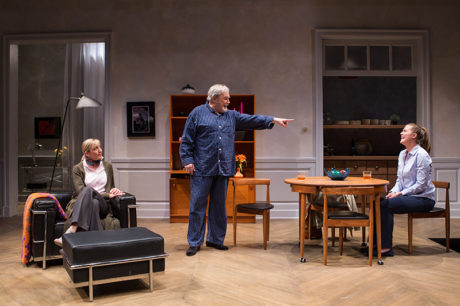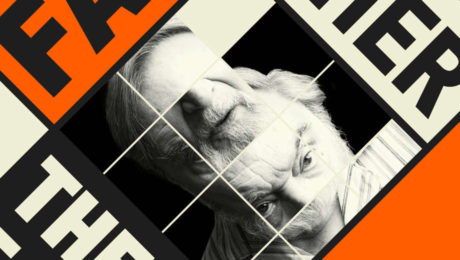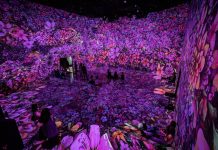There are reasons aplenty not to miss The Father now playing at The Studio Theatre, and Ted van Griethuysen’s performance in the title role is foremost among them. Recently the recipient of a Helen Hayes Tribute award, van Griethuysen commands the stage with incomparable expressivity of body and voice and presence of mind—even as the character he plays, 80-year-old André, is losing his mental moorings.

The entire production is one of the finest I’ve seen at Studio: The impeccable direction by David Muse. The accomplished supporting cast—Kate Eastwood Norris (Anne), Manny Buckley (Pierre), Caroline Dubberly (Laura), Erika Rose (Woman), Daniel Harray (Man). The design team, notably Lighting Designer Keith Parham and Sound Designer Ryan Rumery, whose inter-scene effects were like episodes of malfunction in André’s brain.
But what made me want to see this play in the first place—and the reason I would see it again in heartbeat—is the script by Florian Zeller (translated from French by Christopher Hampton). What Zeller does with the structure of this play is so brilliant and distinctive it qualifies for authorial adjective status as Zellerian (à la Pinteresque and Beckettian).
(I just googled Zellerian and got nothing. You read the coinage here first.)
I first experienced what is singularly Zellerian last August in London. There was a hit play running in the West End called The Truth. I recognized the name of the playwright (whom I had not otherwise heard of) as the author of a play programed for the 2016-2017 season at Studio. So I thought I ought to check him out.
Broadly speaking, The Truth is a four-character comedy about marital infidelity. Two pairs of straight people coupling outside their vows who then get caught inside their lies.
Ho-hum, right?
I am so tired of the adultery trope in theater. Commercial theater is obsessed by it. Bourgeois boulevard-comedy audiences can’t be tickled and titillated enough by it. Adultery is the guilty-pleasure masterplot for wedded masses yearning to breathe free.
Okay, maybe I’m overreacting. But my point is that Zeller’s The Truth took that overdone subject and transformed it into a script structure that fundamentally altered my experience of theatergoing. Scene after scene, the script led me to think one thing only to suspect in the next and the next it’s really another thing, then in the end the script got me realizing as I looked back on its canny construction that this was not surreal; it all made sense. Moreover in playing with my perception of what is real—constantly reframing and renaming it—the script structure momentarily altered my own reality as a conscious, sentient self.
Just as Beckett’s plays affect how the world looks when we walk out of the theater, and just as Pinter’s plays attune us to subtexts in interpersonal relations, Zeller in The Truth takes apart how we piece together reality in our minds.

Which is exactly what Zeller does in The Father. And as in The Truth, Zeller takes on a topic that has already been done to death in drama. In this case it’s late-life mental decline and senescent amnesia. Broadly speaking, The Father—which Zeller calls “a tragic farce”—is about a man with dementia. But that doesn’t begin to convey the play’s Zellerian genius. Scene after scene, we are led to think one thing only to suspect in the next and the next it’s really another thing, then in the end we realize as we look back on what has transpired it all makes sense; but with astonishment we realize Zeller’s script structure has brought us into the faltering mind of the main character. We have been experiencing what it’s like to think like he does. We have been both outside and inside the play.
I don’t want to give away how Zeller achieves this. Best to be taken by perplexity and surprise at each twist and turn. But know going in to see The Father at Studio that your brain will be different when you come out.
Running Time: 90 minutes, with no intermission.
The Father plays through June 18, 2017, at The Studio Theatre – 1501 14th Street, NW, in Washington, DC. For tickets call the box office at (202) 332-3300, or purchase them online.
VIDEO:
LINKS:
Review: ‘The Father’ at The Studio Theatre by





